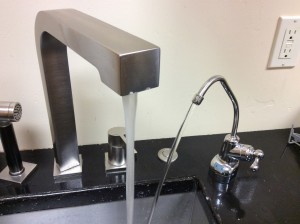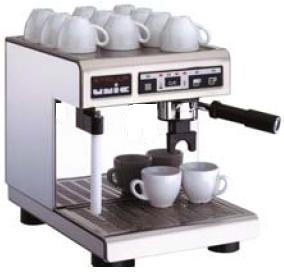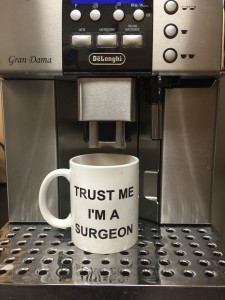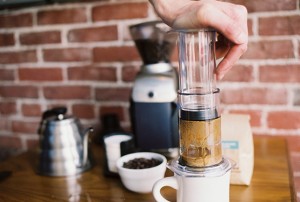
Most people use a filtering system, like the reverse-osmosis system on the right, for drinking water. But water out of the tap in Phoenix-Scottsdale proves to be the best flavor for coffee
Did you ever consider using tap water for your coffee? You should. It turns out that tap water provides a better source of minerals that smooth out the flavors of coffee – removing bitterness.
When I first moved to Phoenix from Seattle, in 1991 the water from the tap tasted horrid. I was not about to place such into my coffee. I used reverse-osmosis water to make coffee and wondered why the espresso was thin with more of a bitter after-taste. I thought the coffee had changed, but then I went to Italy.
I noticed at the coffee shop in Rome (Sabatini near the Spanish Steps) that they were using bottled water to make their coffee. “Ah ha, they use bottled water too,” I noted to my traveling companions. The gentleman stopped and said, “Si, we get our water from the aquifers – it is perfect and hard.”
I asked to drink it- “No, senior, you don’t want to drink this water.” I did. It tasted awful – it reminded me of something- it reminded me of Phoenix city water.
Returning to Phoenix I wondered – could I have made a mistake by using reverse osmosis water, or some filtered water? So I began a series of experiments. Every morning I would make two cups of espresso – one from the filtered water and then from other sources.
The first water I tried was from the tap and the coffee was improved, but just not like what I had in Italy. Then I remembered, the house has a salt-soft water system. I went outside and filled a pitcher of water from the hose (which isn’t connected to the home water softener). Turns out that espresso (from hard water) was even better than tap.
Over the course of the next few months I tried different sources of water. Bottled water, various water filtering systems. When in neighboring towns like Scottsdale, Mesa, Glendale, Chandler, and Peoria, I brought home samples of water from my friends hoses, since their outside water wasn’t on their water softening system this was the easiest way to get that community’s hard water.
During this time in Phoenix (1990’s) I used Starbucks, ground with a burr grinder, and made the coffee using an identical system of pressure (9 atmospheres) and temperature (190-200 degrees F) with 7 grams of coffee. The coffee maker used was my old Unic Pony.

My old Unic Pony – long gone, but well remembered
The end result: Phoenix water is perfect for a cup of espresso. Who knew the reason I loved this town was the water – not to drink, but to make coffee. And the automatic coffee makers- well, I descale them a lot. But it is worth it.
So try it- make coffee with your tap water – and another cup with your favorite filtered water. Try making an espresso and see how it changes with the harder water. If you have a water softener, then go outside and use your hose to gather some water.
Seriously try the experiment.
Since writing this article I have found a number of researchers who have examined the perfect hardness for water, and which chemicals make the best water. The chemists are fine- but what you need is someone to taste it- so you be the judge.
Then it was time to try for just simple coffee. It is a few years later and now I have a new machine in my life- which makes a perfectly acceptable coffee. It has a Burr grinder, maintains pressure, and produces a uniform cup of coffee (perfect for experiments).

How I make coffee in the morning. I don’t own a Keurig, nor am I paid by them. But I do love coffee – and …
I began to experiment making standard coffee with the new machine: the water from the tap (no softener) and reverse osmosis. Once again the results were reproduced – coffee made with Phoenix tap water, tastes better than any filtered or bottled water. A close second is the water from Scottsdale, followed by Peoria, Chandler, and Mesa. Bottled, filtered, RO, or distilled water leaves to bitter a taste, and no smooth, velvet after flavor.
I also tried adding some salt to the ground coffee before running water through it – and predictably, this did not result in any improvement over the water from the Phoenix tap.
At my office in Scottsdale there is a Keurig coffee maker, which I tried with Peet’s Major Dickason blend, with my water from Phoenix, the tap there (it is filtered) and the Reverse Osmosis water. Again the results showed that the hardness of the water in Phoenix produces the most amazing coffee, and remarkably different.
So for those who say to use filtered water- I say – experiment, and see what you like.
When I travel I bring an Aeropress Coffee maker – and test coffees from different cities taps as well as hotel water. To test these waters I use an inverted method of coffee using 17 grams of coffee (one rounded aeropress spoon) and use a burr grind- to about the consistency of table salt. With my kettle the water is 200 degrees after it is off the boil for 45 seconds. I place one shot of water – and stir with the paddle for 20 seconds.  Then add another shot of water allowing it to steep for 30 seconds more. Invert, gently press and pour and then add more water to the cup.
Then add another shot of water allowing it to steep for 30 seconds more. Invert, gently press and pour and then add more water to the cup.
Over the course of a couple of decades I’ve managed to compile information from a variety of cities around the world, as well as from different types of water that has been filtered to remove various chemicals. What does not correlate with taste is the taste of the water. Some cities have amazing water that you can drink right out of the tap, but if you test that for coffee against cities that have almost undrinkable tap water, the coffee from those places is better.
New York City, Seattle, Portland (OR), Anchorage all have water that you can drink out of any tap and enjoy. Hotels in those cities do not feel the need to filter that water. Compare New York City water for coffee to Phoenix, and it is clear that Phoenix makes a much better cup of coffee – but you would never want to drink the tap water from Phoenix.
Other cities, like Los Angeles, it takes work to get tap water. Most hotels will filter the water to make it taste better – but if you get water from a public fountain, or the hose of a friend you will find that water from LA makes a lovely cup of coffee. This led to the question if some filter systems work better to make coffee than others. Various home water systems have been introduced – some of them quite expensive (Kinetico, Culligan) and others not (Brita and Pur systems). None of the filtered systems produced a coffee that was better than what came from the tap.
Not all bottled water is alike either. While some bottled water is nothing more than filtered water from the area, some bottled water is more like spring water – which means it has variation for chemicals.
After hundreds of cups of coffee- and many sleepless nights, here were the reults:
Best cities for coffee from tap water:
Phoenix, Scottsdale, Rome, Trieste, Los Angeles, San Diego
Best bottled water for coffee:
Badoit bottled water and Aqua Della Madonna
One final important health note:
Most of the water we found that was best had higher content of Magnesium. It also turns out that water which has higher magnesium content is associated with a lower risk of heart attacks. Making your coffee with tap water does more than just taste good- it may be good for your heart.
